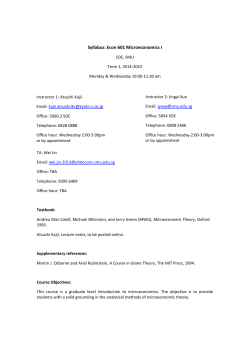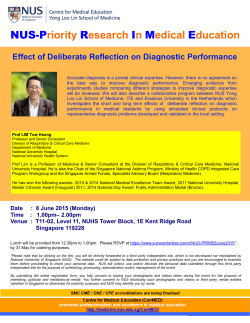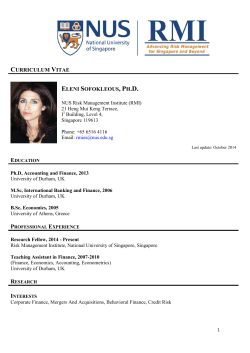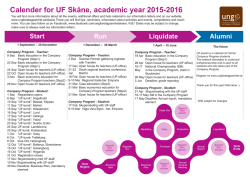
SEP Report - National University of Singapore
SEP Report 1. Student Information Name (as in myisis) Faculty/Major Host University NUS Semester and Year of Exchange (eg. AY14/15 Semester 1) Yip Zhi Heng, Jonathan Electrical Engineering University of Adelaide AY 14/15 Semester 1 2. Study at Host University Please provide information on the academics at your host university: - Studying or learning culture at your host university. How were classes conducted? - What did you like most or dislike most about the academics at your host University? - Advice on module registration and module mapping Being a commonwealth country like Singapore, classes were conducted very similarly to Singapore. There were lectures, tutorials and practical sessions. Most lectures were held in 1 hour periods three times a week (compared to NUS’s 2 hour periods). Tutorial and practical sessions were held pretty much the same way except that there was more guidance provided in the practical sessions there and the practical lesson flows more methodicaly and the objectives were much clearer compared to Singapore’s style. We should emulate them in this regard. The academics were very open to ideas and they seemed to have more time to help students. Not that they are free 24/7 but they always set aside consultation time every week. They were also available to help students with assignments. They wouldn’t tell you the solutions or do half the work for you but they would guide you in the right direction. Module mapping is a little challenging. I found that many students based their choice of exchange universities on the module mapping history of past year students. That is a pretty lazy way of looking for a suitable university and I would not recommend it because it limits your choice of universities and unnecessarily constraints the number of modules you think (but you don’t know) you can do overseas. When I chose the university of Adelaide, there was no module mapping history on the SEP website for Electrical and Computer Engineering. I was at first dismayed, but when I checked the Adelaide University website I found that both universities have very similar curriculums (like 70% the same) so I didn’t have to worry about module mapping there. Module registration in Adelaide University is a lot easier than in Singapore and the website interface is a lot cleaner than NUS’s. There was also no complex balloting/bidding nonsense. The website shows you the number of available places in the tutorial class and you can select your desired class based on that. Please list the courses that you took during SEP. (Please take note that the list of modules available to exchange students at the host university are subject to change. This table merely serves as reference.) International Relations Office (IRO) SEP Report Host University Module code Course title ELEC ENG 2009 Engineering Electromagnetics ECTS Credit 3 COMP SCI 1201 Introduction to Programming for Engineers 3 PHYSICS 1200 Physics IB 3 ELEC ENG 2007 Signals & Systems 3 2. Accommodation What kind of accommodation did you stay in during your exchange (eg. on campus / off campus)? Would you recommend this accommodation to future outgoing students? Do you have any other suggestions? I lived in student accommodation that was recommended by the school called Urbanest. I would recommend it because it is highly convenient. It is in the heart of the city and both the school and the supermarket chains (Coles and Woolworths) are 10 minutes away on foot so I spent very little time and money on transportation. It is expensive though (about AU$6000 a semester) so living in the suburbs is a lot cheaper. Just bear in mind that most places do not include utilities and internet in the rent and you may have to subscribe for internet access on your own which can be challenging if you’re living there only for 6 months. 3. Activities during SEP Were there any activities organized by school/student group/external organizations at your host university which you would like to recommend to other students? International Relations Office (IRO) SEP Report The school organizes many activites for exchange students such as tours to Victor Harbour, Barossa Valley and various wild life parks. They have the language and cultural exchange program held on Friday nights which are really popular with exchange students as there is always free food. If you are staying at Urbanest, there are always activities planned out every week, from shopping to sporting activites. If you are a christian, Evangelical Students is a pretty good Christian club. They have various activities such as Bible talks and Bible Study every week and you can make new friends. They also have an international student arm called FOCUS. There are also a number of activities down at Holy Trinity Anglican Church (Adelaide is also known as the City of Churches so there are plenty of religious activities if you’re interested). 4. Cost of Living Please provide an estimation of how much money you spent during your SEP? Please list travel expenses separately. Depends on how often you eat out. One meal sets you back about AU$10. But if you cook and do your shopping at the Adelaide Central market on Saturdays like me (clearance sale day), it can be as low as AU$100 a month. I spent almost nothing on transportation as I lived in the city and almost everything is walking distance. Tram rides within the city are also free. 5. Challenges Did you face any challenging issues during your SEP stint? How did you overcome it/them? Adapting to the new culture required some patience but it worked out very well for me. Difficulties may vary, depending on the individual. I come from an English speaking home so it was not a problem. Living independently required a lot of adjustment for me as shopping, cooking and cleaning required much more time than I had anticipated. Coming back to Singapore was emotionally difficult for me because I don’t know if I’ll ever see my friends again. 6. Overall SEP Experience Please write one paragraph about your exchange experience and attach some photos that represent your exchange experience. International Relations Office (IRO) SEP Report The exchange experience is like a kiss in the dark. It lasts for a short period of time but the experiences and emotions I felt would last a lifetime. In some ways, I was born again. I started my life there from scatch. I did not know anyone, lived in a new place, attended a new school, and ended up having the most rewarding experience I could ever hope for. I made some amazing friends there. We shared many laughs but we also worked hard together. I saw many cultural differences through various interactions but what struck me more was how similar we all are, even though geographically we grew up so far apart. We all shared the same aspirations, struggles, and desires. It is when we focus on our common humanity that we can break down all the cultural boundaries and assumptions that come between us. 7. Suggestions for future outgoing students Please share any other suggestions for future outgoing students. I noticed many exchange students say that they can’t seem to make any new friends there. Exchange can be a lonely experience only if you don’t take the initiative to meet people and make friends. When I first got there, my first priority was to build a social circle. I got to know not just the other exchange students from NUS, but students in school. Your course mates are going to be the people you spend the most time with anyway. Tutorials and lectures are good places to start so come a little earlier and sit beside someone. Say hi (or g’day) and I trust that you can handle the rest from there. Also, please learn how to cook. Eating out can be expensive and you have to take care of your own nutritional needs. International Relations Office (IRO)
© Copyright 2025













